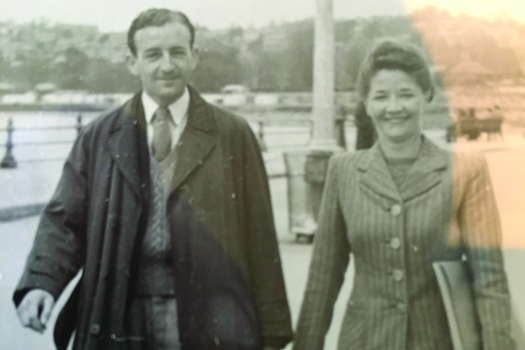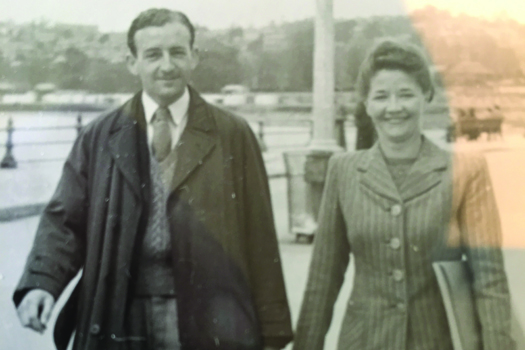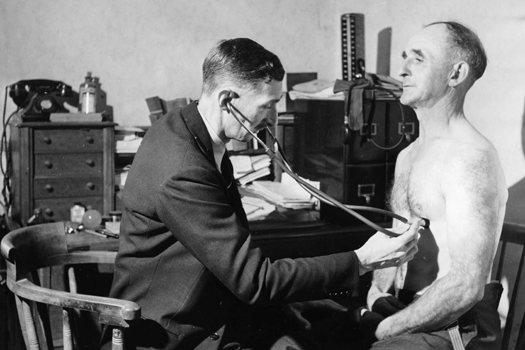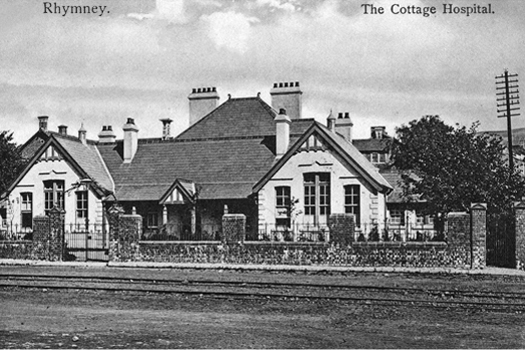A GP’s life in 1948

Profile: Dr Alun Evans

Dr Alun Evans with his wide Enid Evans in 1947
Role: GP principal in South Wales practice
Hours worked per week: In surgery 9 am to 5 pm, Monday to Friday; on call at least three nights a week
Salary: £3,000 per annum
Monday
This morning the surgery is very busy, as is usual on a Monday. By the evening we are full, but it will usually become quieter as the week goes on.
I have a receptionist, but people can just turn up for appointments and there are no specific time slots to see patients. If it’s something that takes a minute to sort out, such as tonsillitis, a minute is what they get; if it’s more complicated they will have more time.
I have 3,500 patients and it is a singlehanded practice, based in my house in Rhymney, South Wales. I started it when the NHS began, so I was never a GP in private practice. Before this I worked in hospital medicine and in the RAF, where patients did not pay you directly as they would have done with GPs before the NHS was formed.
I enjoy being a GP. The patients don’t complain very much, they don’t cause trouble. But I think having everything in the NHS for free is a mistake. I think there should be a charge for it. People who can afford to pay, like schoolmasters, should do. There’s a charge for everything else we use, so why not for doctors?
Tuesday
I was on call last night and a patient had an asthma attack. The way we treat asthma is by giving adrenaline very, very slowly. So when you get a knock on the door in the middle of the night, as I did last night, you have to go and give that.
We also carry opiates for when someone is in a bad way and is not going to live much longer; the patient’s family has to do the rest of the caring. Being able to use antibiotics is fantastic, though. I recently had a patient with pneumonia; I put him on penicillin and he recovered. It was wonderful – 10 years ago he would have died.

GPs often ran their surgery from home in the early days of the NHS. Pic: Getty Images
Wednesday
Today I see a patient who needs more investigation than I can spare time for in the surgery, so I send him to Rhymney Cottage Hospital, to visit later.
The cottage hospital is very important for our work. It has an X-ray department, which is vital for chest medicine. As this is a mining area, there is a lot of chest disease. The men often have gunk in their lungs – ‘dust disease’, they call it. We see lots of obstructive airways disease and plenty of adult asthma, but there is not much treatment available.
I wanted to become a doctor because my brother and sister are doctors too. We were born in India. My father was an engineer and did stints there, then came back to Wales, where one side of the family is from, when I was a year old. After leaving school I went to medical school in Cardiff, in 1938, and qualified in January 1944. I did hospital house jobs and chest medicine with the RAF at St Athan, but after that becoming a GP seemed like the safer option. I followed my brother Ieuan here; he works at the cottage hospital.

Rhymney Cottage Hospital. Pic: Rob Higgins
Thursday
I am out all morning on home visits. Most of our patients are in Rhymney, but we have some in far-off farms up to half an hour’s drive away. The patients aren’t demanding but we can be called out in the middle of the night. Ieuan and I share night duties between us. There are district nurses too, but we do everything else. I have even delivered some babies, and I expect I will deliver a lot more.
It can be difficult for patients to get in touch with us. Not many have telephones – in fact there is maybe just one telephone per street, so usually someone has to come and knock on the door. If I am already out, it has to wait until I am home to pick up the message and then go out again.
Friday
I was out again last night to visit a dying patient. Because anyone can turn up at any time, it means my wife has to help too. She was a nurse when we met so she understands the demands on a doctor’s time. I will always go out to visit someone. But it’s hard work. My wife and I can’t really have a day out as I always need to be near the practice. We don’t get many weekends off and I expect I will be working over Christmas. We get two weeks’ holiday a year, that’s it – and I am looking forward to those.
As told to Emma Dent
Pulse October survey
Take our July 2025 survey to potentially win £1.000 worth of tokens











